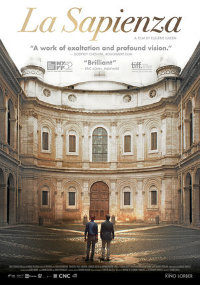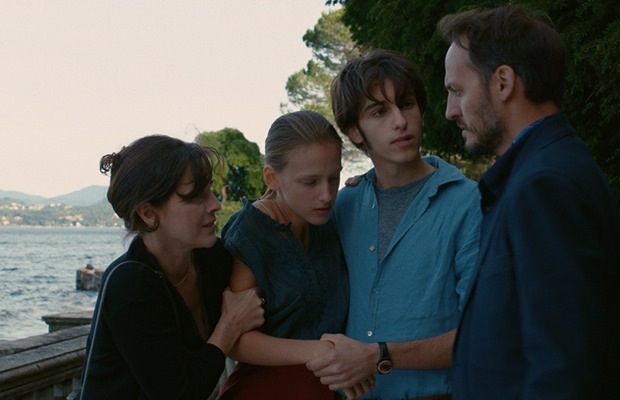Reviews
La Sapienza | Review #1
Style-Over-Substance in a Fancy Baroque Package
 French “artiste” Eugène Green’s latest work is further evidence that his overriding career trajectory of indulgent reminiscence, has a deliberately staged, minimalist, ultimately alienating style that reflects only the most superficial aspects of the values and artistic sensibilities it emulates. La Sapienza is a testament to the male ego—a vanity piece—that idealizes the past and eschews the present to justify a projected ideology that purports the value of chasing dreams and attempting to recreate the past as a way of coping with the fear of death and ideas of legacy.
French “artiste” Eugène Green’s latest work is further evidence that his overriding career trajectory of indulgent reminiscence, has a deliberately staged, minimalist, ultimately alienating style that reflects only the most superficial aspects of the values and artistic sensibilities it emulates. La Sapienza is a testament to the male ego—a vanity piece—that idealizes the past and eschews the present to justify a projected ideology that purports the value of chasing dreams and attempting to recreate the past as a way of coping with the fear of death and ideas of legacy.
The premise is simple. Alexandre Schmid (Fabrizio Borromini), an aging architect aiding urban sprawl by designing box city housing complexes that serve commerce over culture, decides to embark on a research expedition to Tinico, Switzerland, the birthplace of Francesco Borromini, a renowned 17th Century architect. His quest, as defined by the hyperbolically glum manner in which Alexandre conducts himself, is an attempt to recapture the passion of youth. Schmid’s wife, Aliénor, being little more than a maternal vessel of support and traditionalist virtue—a psychoanalyst motivated by caring for people—tags along, hoping this passion can, in turn, reignite something in their coldly serviceable marriage.
Much like the humdrum heteronormative values proffered by this premise La Sapienza’s failures, and the reasons for them, are transparent. In the late ‘70s, after emigrating from New York to Europe and eventually settling down in Paris, Eugène Green established the Théatre de la Sapience, a space devoted to the performance of baroque theatre. His work in the arts has a persisting preoccupation with the exaggerated, declamatory style of populist 17th Century art and its deliberate, facile aesthetic.
This sense of nostalgia, being a symptom of one’s inability to cope with the world as presented, is his drug. It aids him in creating the anachronistic, overwhelmingly distancing style demonstrated in La Sapienza while similarly limiting him to overly constructed and altogether insincere affectations associated with someone repressing cultural signifiers and naturalistic inclinations to perform a romantic ideal. As such, his work, despite being intriguing in a Marshall McLuhan sense, is as pretentious as it is restricted by this rigid devotion to a past art movement.
Worse is that this obsession with the past and this solipsistic inability to validate any cultural development that doesn’t replicate the same values and aesthetics of 17th Century Europe mires Green’s latest work in antiquated gender binaries and overly perfunctory annihilation anxieties. It’s a singular male work created by someone projecting deliberate eccentricities to compensate for how little is actually going on underneath it all.
The dialogue, staying true to the baroque template, is decidedly minimalistic and strained. Discussions are formalized and constrained by space and firm borders. When Alexandre and Aliénor eventually meet teenage versions of themselves—Goffredo (Ludovico Succio) and Lavinia (Arianna Nastro)—and embark on a very obvious quest of confronting their respective pasts, the directorial structure is oft-confrontational, placing each character square in the center of the screen, detached from the world around them, left only to challenge us with a direct gaze. Since the muscular formality of these exchanges has no sense of naturalism, we’re disengaged from identification and forced to analyze what little is happening before our eyes.
While tactics like this work with more intelligent directors like Catherine Breillat, who often introduces anachronisms to remind us of the medium and its form, here it does little more than reveal an emperor prancing about nude, proud of his new wardrobe. Since the structure of this poorly paced, even dull, art film is entirely conversational—think Abbas Kiarostami without the mystery or human fragility—the repetitive angst about the death of passion and the futility of legacy stick out. What’s problematic is how little insight is actually offered about these metaphysical themes. There are hints of deeper human truths when Alexandre describes the experience of having, and losing, a child but this, and everything else, is fleeting and inflated to seem like more than it is.
Similarly, the pornographic preoccupation with Borromini’s architecture—a visual motif reiterating the missed opportunities of our protagonist—implies more than it’s actually able to say. Within the single-minded prattle about the grandiosity of creating architecture with purpose, with a light, are hints at something meaningful—one discussion raises the question of one’s motivations for destroying architecture and what that means—but because Green has little to offer beyond flipbook cocktail reception topics, he’s never able to expand on these ideas.
As such, the many protracted shots of buildings and requisite cursory voiceover descriptions never attain the intended grandiosity. Instead, they serve as detached window dressing for a work that boils down to some extremely rudimentary observations about the generalized anxieties of bourgeois, affluent, middle-aged white men.
Reviewed on September 11th at the 2014 Toronto International Film Festival – Wavelengths Programme. 100 Minutes
★★/☆☆☆☆☆
Robert Bell is a Toronto-based film critic for IONCINEMA.com and Exclaim! Magazine, where he was also the editor for film festivals and books. Robert covers North American Film Festivals such as Sundance, Hot Docs, Tribeca and TIFF. Robert studied film theory and screenwriting at York University and has a background in independent film production. Top Films From Contemporary Film Auteurs: Campion (The Piano), Kiarostami (Certified Copy), von Trotta (Hannah Arendt), Marsh (The Theory of Everything), Haneke (The White Ribbon), von Trier (Antichrist), Seidl (Dog Days), Moodysson (Lilya 4-Ever), Ramsay (Ratcatcher). Winterbottom (The Claim), Malick (The Tree of Life), Ceylan (Once Upon a Time in Anatolia), Cronenberg (Dead Ringers), Verhoeven (Starship Troopers), Bigelow (Point Break), Jordan (The Crying Game), The Dardennes (Lorna's Silence), Zyvagintsev (The Return), Porumboiu (Police, Adjective), Ozon (Dans la Maison).

























